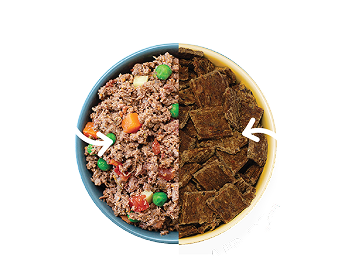
Can Dogs Have Marshmallows?
Who can resist the allure of marshmallows, those fluffy, sweet clouds that melt so delightfully in hot cocoa? It's tempting to share every snack with our dogs, especially when they gaze longingly at our treats. But when it comes to feeding our dogs, not all human foods are fair game.
Interested in discovering more? Your friends at A Pup Above have you covered. Read on as we explore whether marshmallows are safe for dogs and what to consider before letting your pup chomp on a marshmallow.
What Are Marshmallows?
At first glance, marshmallows seem simple enough — just soft, sweet puffs waiting to dissolve on your tongue. Traditionally, they're a mix of sugar, water, and gelatin whipped into a frothy blend that sets into the spongy treats we know.
Originating from a medicinal concoction made from the marshmallow plant, today’s versions are far from their herbal beginnings, crafted instead for pure indulgence. Found in everything from desserts to campfire snacks, marshmallows are a staple in many sweet treats.
Are Marshmallows Bad for Dogs?
While a single marshmallow won't likely lead to an emergency for most dogs, routinely feeding them these sugary treats can be harmful. Marshmallows are packed with sugar, which can contribute to unhealthy weight gain and dental problems in dogs.
Just like in humans, excessive sugar intake can lead to diabetes and other health issues in our canine companions. Moreover, some marshmallows contain xylitol, an artificial sweetener that is toxic to dogs. Xylitol can cause a rapid drop in a dog's blood sugar and lead to liver failure, making any product containing it extremely dangerous.
In addition to sugar and potential xylitol, marshmallows offer no nutritional benefits to dogs. They lack the proteins, vitamins, and minerals that dogs need to maintain health.
Essentially, while they aren’t nutritious, the bigger danger lies in those that include toxic additives. Therefore, it's best to keep your pup away from these treats and not consider them a part of their diet.
What Should I Do If My Dog Eats a Marshmallow?
If your dog sneaks a marshmallow, there's no need to panic right away.
Here’s what you can do:
- Check the Ingredients: First, determine whether the marshmallows your dog ate contain xylitol. If xylitol is present, contact your veterinarian immediately, as it can be life-threatening.
- Observe Your Dog: Watch for any signs of distress such as lethargy, vomiting, or difficulty walking. These symptoms may arise particularly if they've eaten marshmallows with xylitol.
- Contact Your Veterinarian: Even if the marshmallows didn't contain xylitol but your dog ate a large amount, it's a good idea to call your vet. They can advise you on the best course of action, which might include monitoring your dog for signs of sugar overload or gastrointestinal upset.
- Prevent Future Incidents: To avoid such scenarios in the future, ensure all sweets, especially those containing xylitol, are stored securely out of your dog’s reach. This helps prevent accidental ingestions and keeps your pup safe from harmful substances.
By being mindful of what treats you share with your dog, you can help ensure they stay happy, healthy, and far from unnecessary vet visits.
What Are Healthier Treat Alternatives for Dogs?
As dog parents, we always want what’s best for our dogs, especially when it comes to their diet. While marshmallows are a definite no-go, there are plenty of healthy, delicious alternatives that not only satisfy those tail-wagging taste buds but also contribute to their overall health.
Let’s explore some fantastic treat options that will make your pup jump for joy — without any of the guilt.
Carrots
Carrots are a crunchy, sweet treat that many dogs love. They're low in calories and high in fiber and vitamins. Plus, munching on carrots can be good for your dog's teeth, helping to remove plaque as they chew. Just be sure to cut them into manageable pieces to prevent choking.
Apples
Apples are another great option, providing vitamin C, fiber, and calcium. They're also sweet, which can satisfy your dog's sugar cravings in a healthier way. Remember to remove the seeds and core before giving them to your dog, as apple seeds contain cyanide, which can be harmful in large quantities.
Chicken
Cooked chicken is a superb source of protein for dogs and can be used as a meal topper or a high-value training treat. Make sure it’s cooked without any harmful additives like onion or garlic powder and is free from bones that could splinter and cause harm.
Turkey
Like chicken, turkey is a lean protein that dogs find irresistible. It’s ideal for adding a little variety to your dog’s diet. As with all meats, make sure it's cooked plain, without any seasonings or sauces.
Freeze-Dried Liver
Freeze-dried liver treats are a hit among many dogs. These treats are rich in protein and have a taste that dogs seem to love. They're also easy to carry and store, making them a perfect on-the-go treat during training sessions.
Fish Skins
Fish skins are crunchy and packed with omega-3 fatty acids, which are great for your dog's skin and coat. They make a fantastic alternative to rawhides, which are often processed with chemicals and can pose choking hazards.
Peanut Butter Pops
Make a simple, healthy frozen treat using plain peanut butter (make sure it’s xylitol-free!), a little water, and a banana. Blend them together, pour into an ice cube tray, and freeze. These pops are great for cooling down on hot days and are a tasty, protein-rich snack.
Sweet Potato Chews
Slice sweet potatoes thinly and dehydrate them in an oven to make chewy, tasty treats that are full of vitamins A and C. These are a great low-fat option for dogs watching their weight.
High-Quality Commercial Treats
Look for commercially prepared treats that list whole food ingredients and are free from fillers, artificial colors, and preservatives. Brands like ours ensure that each treat is not only delicious but also crafted to support the health and wellness of your pet.
How Can the Right Treats Benefit Your Pup?
We've covered the scoop on marshmallows and explored some alternatives, but how exactly do the right treats benefit your pup? Opting for high-quality, nutritious choices isn't just about steering clear of the bad stuff—it's about actively boosting your dog’s well-being.
Our human-grade, sous-vide dog food is crafted to maximize nutritional benefits. Dishes like Turkey Pawella and Texas Beef Stew, rich in proteins, vitamins, and minerals, are not only delicious but also vital for your dog's health. Choosing the right food means every meal is a step toward a healthier, happier life for your beloved dog, ensuring they thrive with every bite.
Conclusion
Can dogs have marshmallows? The short answer is it's best to avoid them.
Marshmallows are sugary treats that offer no nutritional benefits and could contain ingredients harmful to dogs, like xylitol. As responsible pet parents, it's crucial to focus on healthier, safer alternatives that not only delight but also nourish our pups.
At A Pup Above, we're committed to enhancing your dog's health with every bite. Our meals are crafted with the same level of care and quality you'd want for any family member, ensuring your dog enjoys both deliciousness and nutrition. Explore our range of products designed to keep your dogs happy, healthy, and thriving!
Sources:
Marshmallow | Description & Preparation | Britannica
What Are Marshmallows Made Of? | Cooking School | Food Network
Paws Off Xylitol; It's Dangerous for Dogs | FDA
How to Choose the Best Treats for Training, Rewards, and More | AKC
Top Stories

Why Do Dogs Lick Their Paws?

Why Do Dogs Whimper & Make Noises in Their Sleep?

Healthy Vet-Approved Homemade Dog Food Recipes

How To Cook Sweet Potatoes for Dogs






















